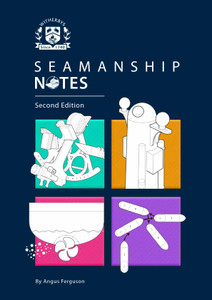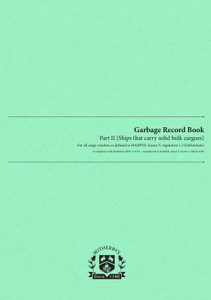
This publication aims to help shipping companies comply with the latest requirements of the International Convention for the Prevention of Pollution from Ships (MARPOL), Annex V (regarding treatment and disposal of garbage).
This guide outlines the requirements for ships to prepare and implement garbage management plans, in accordance with the latest requirements of MARPOL Annex V, which entered into force in 2013, 2017 and 2018.
It also includes a poster on marine plastics.
Garbage dumped at sea can actually be as harmful as oil or chemicals. Plastics in particular can take years to degrade, and fish and other marine life can easily confuse plastics with food. As well as doing great harm to marine life and threatening biodiversity, dangerous toxins can enter the food chain, ultimately being consumed by humans.
While the vast majority of garbage found at sea originates from land, it is no longer acceptable (with very limited exceptions) for any merchant ship to dispose of garbage at sea because of the seriously damaging effects on the marine environment.
Any incident involving the illegal dumping of garbage may result in criminal convictions and heavy fines. This in turn may severely damage a company’s reputation and impact its commercial performance. Ignorance of the regulations is no defence. If a ship and its crew are seen to pose a risk of marine pollution, the vessel can be detained by Port State Control until any deficiencies are corrected.
The International Convention for the Prevention of Pollution from Ships (MARPOL), adopted by the International Maritime Organization (IMO), covers six categories of marine pollution. The treatment and disposal of garbage is regulated by MARPOL Annex V.
Significant amendments to Annex V were adopted in 1995 that require ships to have a Garbage Management Plan and a Garbage Record Book. The first edition of this ICS Guidance was originally published in 1998, coinciding with the global entry into force of these mandatory requirements.
Modern products commonly use materials, like plastic, which persist in the marine environment and therefore require special processing before disposal on shore. An essential feature, therefore, of the current IMO Annex V regime is the requirement for ships to prepare and implement Garbage Management Plans, on which the first edition of this ICS Guidance provided detailed advice to shipping companies.
This second edition of the ICS Guidance updates this advice on best practice in line with the most recent changes to MARPOL Annex V. This includes the IMO amendments which entered into force globally in 2013, 2017 and 2018.
The amendments which entered into force in 2013 increased the application of the regulations, expanding their scope by broadening the definition of what constitutes garbage and introducing a general prohibition of its discharge into the marine environment. The amendments which entered into force in January 2017 make environment-related provisions of the Polar Code (applicable to Annex V) mandatory. The latest amendments which entered into force in March 2018, among others changes, include a definition of ‘E-waste’, new criteria to establish whether or not ‘cargo residues’ are harmful to the marine environment (HME or non-HME), as well as a new format for the Garbage Record Book which has been divided into two parts and now includes the new E-waste category. As of 2018, receipts obtained from reception facilities must also be kept on board for at least two years.
This revised edition also takes full account of the adoption by the IMO Marine Environment Protection Committee, in 2017, of IMO Guidelines for the Implementation of MARPOL Annex V, as well as the 2012 Guidelines for the Development of Garbage Management Plans. These IMO Guidelines are intended to provide a uniform format for the development of Plans and to assist ship operators in the implementation of Regulation 10 of MARPOL Annex V.
In summary, the disposal of almost all kinds of garbage at sea is now prohibited (with the exemption, under specific conditions, of food waste, animal carcasses, cargo residues contained in wash water, and environmentally friendly cleaning agents).
It is hoped that this updated ICS Guidance will continue to provide assistance to ship operators in their efforts to ensure full compliance with MARPOL Annex V, consistent with the United Nations Sustainable Development Goal (SDG 14) for the environmental protection of the ocean.
Foreword to Second Edition
Purpose and Scope
Structure and Layout
Terms Used and Their Meanings
Plastics Poster
Section 1: Overview of Regulatory Requirements
Section 2: Developing the Garbage Management Plan
Annexes:
Annex A: Form of Garbage Record Book
Annex B: Model Placards
Annex C: Advance Notification Format
Annex D: Waste Receipt Format
Annex E: Format for Reporting Alleged Inadequacies of Port Reception Facilities
Tables:
Table 1: Summary of restrictions to the discharge of garbage into the sea (under Regulations 4, 5 and 6 of MARPOL Annex V and Chapter 5 of Part II-A of the Polar Code)
Table 2: Compaction options for shipboard-generated garbage
Table 3: Incineration options for shipboard-generated garbage
Table 4: Options for shipboard handling and discharge of garbage
ICS
The International Chamber of Shipping (ICS) is the principal international trade association for the shipping industry, representing shipowners and operators in all sectors and trades.
ICS membership comprises national shipowners' associations in Asia, Europe and the Americas whose member shipping companies operate over 80% of the world's merchant tonnage.
Established in 1921, ICS is concerned with all technical, legal, employment affairs and policy issues that may affect international shipping.
ICS represents shipowners with the various intergovernmental regulatory bodies that impact on shipping, including the International Maritime Organization.
ICS also develops best practices and guidance, including a wide range of publications and free resources that are used by ship operators globally.
- Number of Pages:
- 59
- ISBN:
- 9781916232273
- Published Date:
- June 2020
- Book Height:
- 0 mm
- Book Width:
- 0 mm
- Author:
International Chamber of Shipping
- Preview:
- Yes
- Publication Date:
- June 2020






